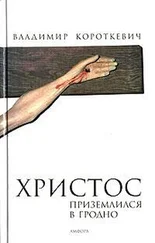We went into a little room where it smelled of mice, and immediately pools of water ran down from our clothes onto the floor. I glanced at my feet and was horrified: almost up to my knees there was a brown mass of mud that looked like boots.
The old woman only shook her head.
“You, Mr. Merchant, must light a big candle as an offering to God for having escaped so easily!” And she opened a door leading into a neighbouring room where the fireplace was lit. “You've had a narrow escape. Take off your clothes, dry yourselves. Have you any other clothes to get into?”
My sack luckily was dry. I changed my clothing before the fireplace. Our clothes — mine and the coachman's — the woman dragged away somewhere and returned with dry clothing for the coachman. She came in paying no attention to the coachman being quite naked, standing bashfully with his back turned to her.
She looked at his back that had turned blue and said disapprovingly:
“You, young man, don't turn your back to me. I'm an old woman. And don't squeeze your toes. Here, take these and dress yourself.”
When we had somewhat warmed up at the fireplace, the old woman looked at us with her deep sunken eyes and said:
“Warmed up a bit? Good! You, young man, will go to sleep with Jan, it won't be comfortable for you here... Jan!”
Jan appeared. An almost blind old man about 60 years of age, with long grey hair, a nose as sharp as an awl, sunken cheeks, and a moustache reaching down to the middle of his chest.
At first I had been surprised that the old woman, alone with oven prongs in her hands, had not been afraid to open the door to two men who had appeared in the night from no one knew where, but after I had seen Jan, I understood that he had been somewhere in hiding and she had depended on him for help.
The help was “just grand”: in the hands of the old man I saw a gun. To be exact, it wasn't a gun: “a musket” would be a more correct name for the weapon the man was holding. It was approximately six inches taller than Jan himself, the gun barrel had notches in it and was bell-shaped at the end, the riflestock and butt-stock were worn from long handling, the slow match was hanging down. In a word its place was in an Armoury Museum. Such guns usually shoot as do cannon, and they recoil on the shoulder with such force that a person unprepared for the shock drops down like a sheaf on the ground.
And for some reason or other I thought with pleasure of the marvelous English six-shooter that was in my pocket.
Hardly able to move his unbending legs, Jan led the coachman to the door. I noticed that even his hands were trembling.
“Dependable aid for the mistress,” I thought.
But the mistress touched me by the shoulder and invited me to follow after her into the “apartments”. We passed through yet another small room, the old woman opened another door, and I quietly gasped in surprise and delight.
Meeting our gaze was a great entrance-hall, a kind of a drawing-room, a customary thing in ancient castles. And oh! The beauty there!
The room was so enormous that my gloomy reflection in the mirror somewhere on the opposite wall seemed no bigger than the joint of my little finger. The floor was made of oak “bricks” already quite worn, the exceptionally high walls were bordered at the edges with shining fretwork blackened by the years, the windows almost under the ceiling, small ones in deep lancet niches.
In the dark we had evidently hit on a side porch, for to the right of me was the front entrance: a wide door, also a lancet one, divided by wooden columns into three parts. The flowers, leaves and fruit carved on the columns were cracked with time. Behind the door in the depth of the vestibule was the entrance door, — a massive, oak door, bound by darkened bronze nails with square heads. And above the door an enormous dark window into the night and darkness. On the window a ship of forged iron, a masterpriece of workmanship.
I walked along the hall in amazement: what splendour, and how all had been neglected due to people's carelessness. There was massive furniture along the walls — it squeaked even in answer to footfalls. Here an enormous wooden statue of St. George, one of the somewhat naive creations of the Belarusian national genius, and at the feet of the statue a layer of white dust, as if someone had spread flour over it; this unique work had been spoiled by wood-lice. And here hanging down from the ceiling was a chandelier, also of surprising beauty, but with more than half of its pendants missing.
It might have seemed that no one lived here, were it not for an enormous fireplace, its flames lighting up the entrance-hall with an uncertain flickering light.
Almost in the middle of this splendid entrance-hall a marble staircase led up to the first floor, where everything was almost the same as on the ground floor — the same enormous room, even a similar fireplace also lit, except that on the walls the black wood (probably oak) alternated with shabby coffee-coloured damask wall-paper and on this wall-paper in all their splendour were portraits in heavy frames. And in addition near the fireplace there stood a small table and two armchairs.
The old woman touched me by the sleeve:
“Now I'll lead you to your room. It's not far from here along the corridor. And afterwards... perhaps you would like to have supper?”
I did not refuse, for I hadn't eaten anything all day.
“Well then, sir, wait for me...”
She returned in about ten minutes, a broad smile on her face, and in a confidential tone said to me:
“You know the village goes to bed early. But we here don't like to sleep, we try to go to bed as late as possible. And the mistress doesn't like visitors. I don't know why she suddenly consented to admit you into her house, and even lets you share her supper-table. (I hope, sir, you will excuse me). You are evidently the most worthy of all those who have been here in the last three years.”
“You mean then,” I said, surprised, “that you are not the mistress?”
“I'm the housekeeper,” the old woman answered with dignity. “I am the housekeeper. In the best of the best houses, in a good family, understand this, Mr. Merchant. In the very best of the best families. This is even better than being the mistress of a family not of the very best.”
“Then what family is this?” I asked imprudently. “And where am I?”
The old woman's eyes blazed with anger.
“You are in the castle of Marsh Firs. And you ought to be ashamed of yourself not to know the owners. They are the Janoŭskis. You understand, the Janoŭskis! You must have heard of them!”
I answered that I had, of course, heard of them. And this reassured the old woman.
With a gesture worthy of a queen, she pointed to an armchair, (approximately as queens do in the theatre when they point to the executioner's block ready for their unlucky lover: “There's your place, you ill-fated one”), asked to be excused and left me alone.
The change in the old woman surprised me greatly. On the ground floor she moaned and lamented, spoke with that expressive intonation of the people, on the first floor she immediately changed, became the devil alone knows what. Apparently, on the ground floor she was at home, whereas on the first she was nothing but the housekeeper, a rare guest, and changed correspondingly with the passage.
Remaining alone, I began to examine the portraits that gleamed on the walls. There were about seventy of them, some ancient and some quite new — and a sad sight they made.
Here a nobleman dressed in something like a sheepskin coat — one of the oldest pictures — his face the face of a peasant, broad, healthy, with thick blood in his veins.
And here another, this one already in a long silver-woven tunic with a girdle, a wide beaver collar falling across his shoulders (a sly proto-beast you were, young man!). Next to him a powerful-looking man with shoulders like stone and a sincere look about him, in a red cloak (at his head a shield with the family coat-of-arms, the top half smeared with black paint). And farther on, others just as strong, but with oily eyes, lopped off noses, their lips hard.
Читать дальше



